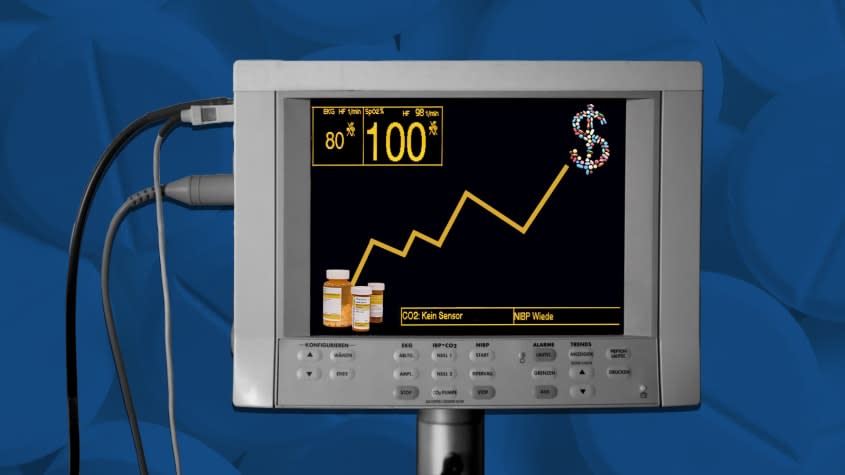Will Medicare drug price controls save lives?

The Biden administration has named the first 10 prescription medicines subject to price negotiations by Medicare under last year's Inflation Reduction Act. The list is made up of some of Medicare's most costly drugs, including popular blood thinner Elequis from Bristol Myers Squibb, and rheumatoid arthritis treatment Enbrel from Amgen, and other treatments commonly prescribed for the 66 million Americans covered by Medicare and 94 million on Medicaid, Axios reported. Medicare will make its initial price offers in February 2024, and drugmakers will have a month to accept or make a counteroffer.
Proponents say the change will help Medicare beneficiaries, most of them ages 65 and up, who struggle to pay for drugs that cost two to three times more in the United States than in other countries. Medicare pays twice as much for these medicines than the Department of Veterans Affairs, which already negotiates its prices, President Joe Biden said, according to Reuters. Once lower prices are in place, 9 million seniors currently paying as much as $6,497 out of pocket each year see big savings, Biden said, making this the "start of a new deal for patients."
But drug companies have filed a barrage of lawsuits trying to block the negotiation initiative. They argue that this program forces them to endorse lower prices as fair, even if they don't think they are, and will reduce their revenue so sharply it will discourage spending on research to find new cures, doing more harm than good. Will Medicare's price negotiations save money and lives or hurt patients by discouraging the development of the next generation of blockbuster drugs?
Patients stand to save a lot of money
This is a "milestone for the U.S. health system," said Dylan Scott at Vox. Medicare has "enormous leverage," and that's what it will take to force Big Pharma to make drugs more affordable. "The United States pays more for prescription drugs than any other country in the world, and yet, compared with other nations' health systems, the U.S. government has had limited power to try to bring prices down." This has given Big Pharma "carte blanche" to set sky-high prices. Letting Medicare negotiate a better deal will save patients money, starting with the medications for chronic conditions included on the first list. Next up could be the "highest-cost medications for serious acute illnesses like cancer."
Careful what you wish for, stated The Wall Street Journal in an editorial. The Inflation Reduction Act requires Medicare to negotiate much lower prices for 10 drugs this year and 60 by 2029, with minimum reductions of 25% to 60% of list prices and no price floor. Drugmakers that don't negotiate or that reject the government's offer face "crippling" consequences in the form of a huge daily excise tax. "This is extortion, not negotiation," and it will "reduce venture biotech investment by limiting potential future profits." Fortunately, the Supreme Court is likely to find these "sham negotiations" violate constitutional protections against excess fines and the uncompensated taking of private property. If the government isn't stopped, the "unseen costs" of its heavy-handedness will "include lives that could have been saved or extended by new treatments that were delayed or never developed."
Drugs don't help if you can't afford them
There's no denying that "prescription drugs are critical to health," said Lawrence O. Gostin, Andrew Twinamatsiko and Zachary Baron at MedPage Today. But even a miracle cure won't save you if it's priced beyond your reach. "Drug costs remain a barrier" for many people trying to "manage chronic and life-threatening conditions — especially seniors." Average net prices for Medicare outpatient brand-name prescription drugs "more than doubled between 2009 and 2018, from $149 to $353, with each Medicare enrollee spending $2,700 on average." And Big Pharma contributed to the crisis with moves like "gaming the patent system to extend market monopolies, suppressing competition, abusing citizen petitions, and price fixing."
In theory, drug companies don't have to go along if they think Medicare is cutting a "one-sided deal," stated the Toledo Blade in an editorial. "In reality, quitting the program is not an option," because seniors covered by the federal insurance system are the "biggest users of prescription drugs." But there's no reason for major drugmakers to be bitter. They've been protected from negotiation by Medicare for 20 years at the expense of people who struggled with the "unsustainable burden" of paying "artificially maintained" high prices. "It's time to stop making the taxpayer inflate the profits of the drug companies."

